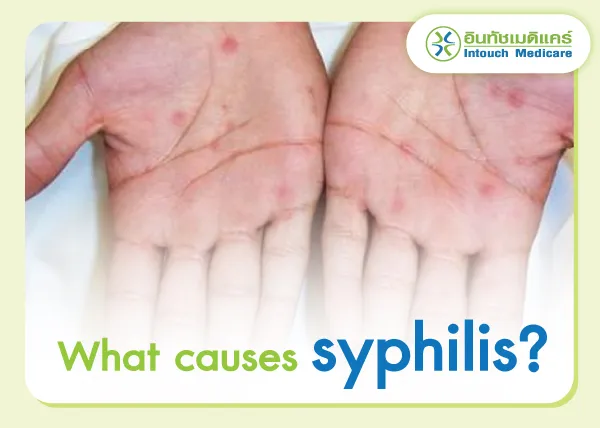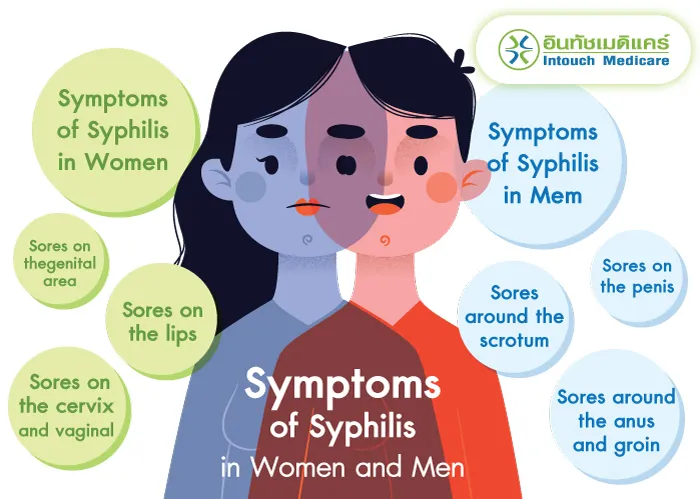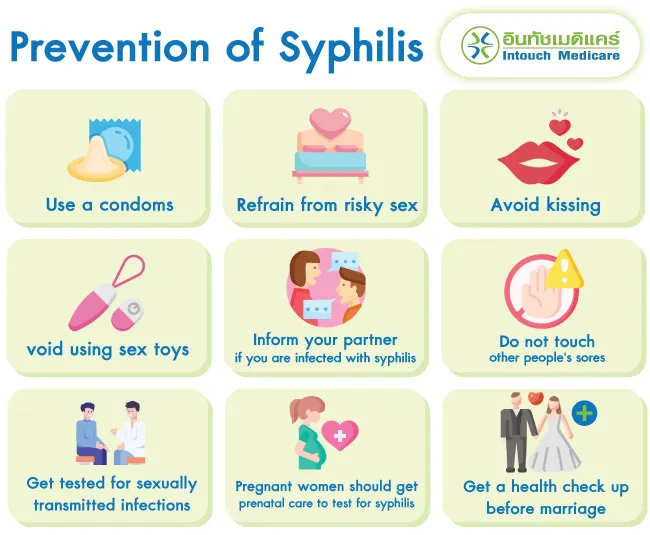Syphilis : Causes and Symptoms - Affordable Treatment at Our Clinic!

Syphilis is a sexually transmitted infection (STI) or venereal disease. In the initial stage, it may cause sores on the genitals or have no symptoms at all. If left untreated, the sores may heal on their own, but there is still a risk of complications.
If you have syphilis, you should see a doctor for diagnosis and appropriate treatment.![]()
Things you should know about syphilis

What causes syphilis?
Syphilis is caused by the bacterium Treponema pallidum. Once contracted, the bacteria spread through the bloodstream, causing pathological changes in various organs.
Symptoms of syphilis
Syphilis can be divided into 4 different stages, depending on the individual. Symptoms may appear in sequential order, not follow the order, or two stages may overlap. In some cases, the bacteria may remain dormant in the body without showing symptoms for many years.
Stage 1 : Primary Stage
The primary stage or primary syphilis is characterized by small red, hard-edged sores called chancres. These can appear on the genitals, mouth, anus, urethra, conjunctiva, or vaginal lining. These sores are typically painless and may appear as a single sore or multiple sores. They can heal on their own within 3 to 8 weeks.
However, the bacteria will remain dormant in the body and can progress to the secondary stage if not treated.
Stage 2 : Secondary Stage
The secondary stage, or secondary syphilis, occurs when the bacteria spread to the lymph nodes and bloodstream, causing rashes or painless and non-itchy sores to appear on various parts of the body, including the genitals, palms, and soles. Other symptoms may include fever, fatigue, hair loss, and body aches.
During this stage, blood tests usually come back positive. The symptoms may gradually disappear or come and go even without treatment, but the bacteria remain dormant in the body and can easily spread to others, progressing to the latent stage.![]()
Stage 3 : Latent Stage
In the latent stage, patients typically show no symptoms. The bacteria can remain dormant in the body for many years before progressing to the fourth stage. During this period, the infection can still be transmitted to others.
Stage 4 : Tertiary Stage
Tertiary syphilis Around 15-30% of untreated individuals are likely to progress to the fourth stage or tertiary stage. |
As the infection spreads throughout the body and gradually damages various organs, it leads to complications in different body systems.
Such as the nervous system and brain, cardiovascular system, liver, eyes, bones, and joints, causing various diseases and abnormalities such as movement disorders, heart valve leakage, aortitis, dementia, blindness, deafness, paralysis, seizures, and can eventually lead to death. ![]()

Symptoms of syphilis in women
In general, the symptoms in both women and men are similar according to the stage. In women, symptoms may include sores on the genitals, around the mouth, on the cervix, or on the vaginal wall.
Symptoms of syphilis in men
In men, symptoms are similar and may occur in areas such as the genitals, around the anus, on the scrotum, in the groin area, and inside the urethra.
To learn more about this topic :
How to recognize the symptoms of syphilis ![]()
How is syphilis transmitted?
These are very frequently asked questions about syphilis. The disease can spread from person to person through direct contact with syphilitic sores, which can occur on the genitals, anus, or inside the mouth.
Therefore, vaginal, anal, and oral sex can lead to infection. ![]()
Additionally, syphilis can be transmitted through bodily fluids by kissing or touching sores. In pregnant women with this infection, it can be passed to the unborn child, resulting in congenital syphilis.
How to know if you have syphilis
When you visit a doctor, they will take your medical history and perform a physical examination if there are any associated risks. This is done to assess preliminary symptoms, and they may also conduct blood tests or take samples from sores or rashes to confirm the diagnosis of the disease.

Treatment for syphilis
For patients with syphilis in the primary stage, doctors will administer a single intramuscular injection of penicillin, even if there are no symptoms.
In the secondary and tertiary stages, doctors will consider giving intramuscular penicillin injections weekly for a total of three doses and may consider intravenous administration if the infection has spread to various systems.
Doctors will schedule blood tests 3 months, 6 months, 1 year, and 2 years after treatment to monitor the condition and prevent the disease from progressing to the final stage.
Where to get tested and treated for syphilis
You can get tested at a syphilis treatment clinic near your home or at a standard healthcare facility that offers STD testing services.
Intouchmedicare Clinic welcomes patients of all genders and ages. Our friendly doctors are available for both scheduled appointments and walk-ins. We provide fast, convenient service without long waiting times. Patient information is kept confidential, and we are committed to providing attentive care.

Prevention of syphilis
Always use a condom during sex.

Avoid high-risk sexual behavior; do not change sexual partners.
Refrain from kissing or performing oral sex with temporary sexual partners.
Do not share sex toys or needles with others.
Do not touch other people's wounds.
If you are infected, inform your partner so they can take preventive measures.
Pregnant women should attend prenatal care and have blood tests as part of their prenatal program to check for infections.

Get screened for sexually transmitted diseases.

Have a health check-up before marriage.
Interesting Articles
For more info and make appointment
Hot Line 081-562-7722
Composer : Warangkana Wiwansirikul, MD.
Last edited : 27/05/2024


